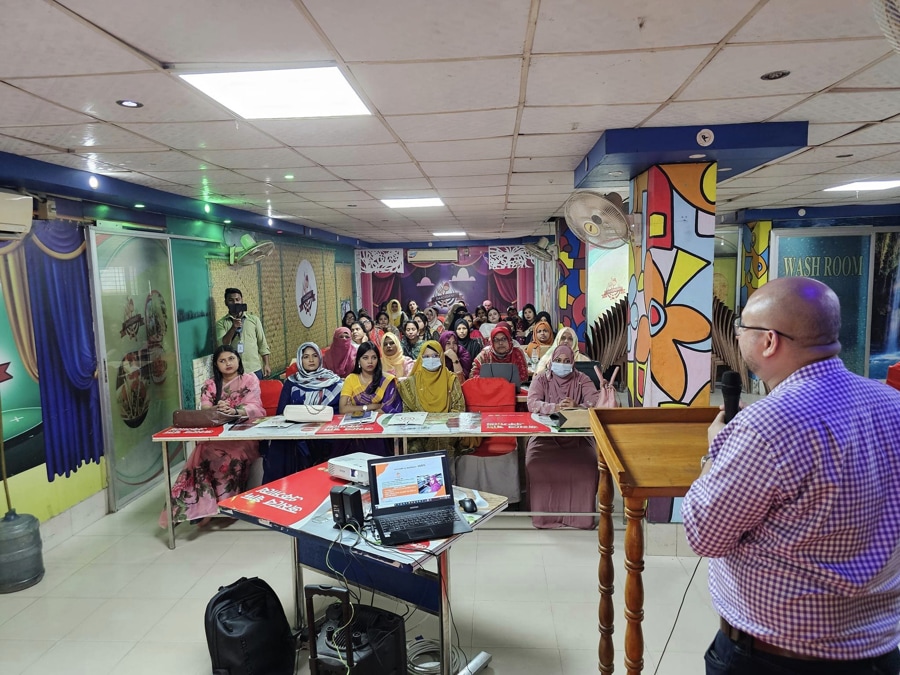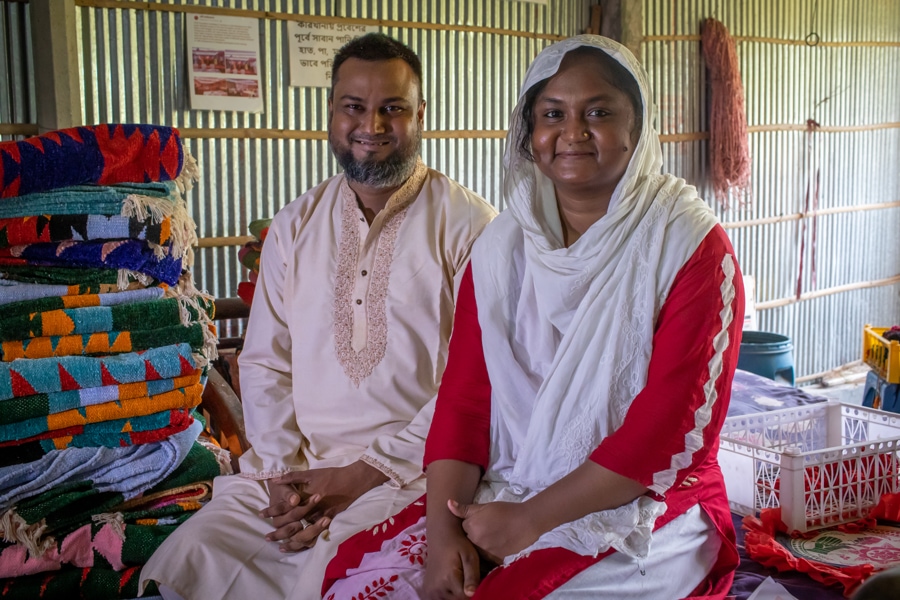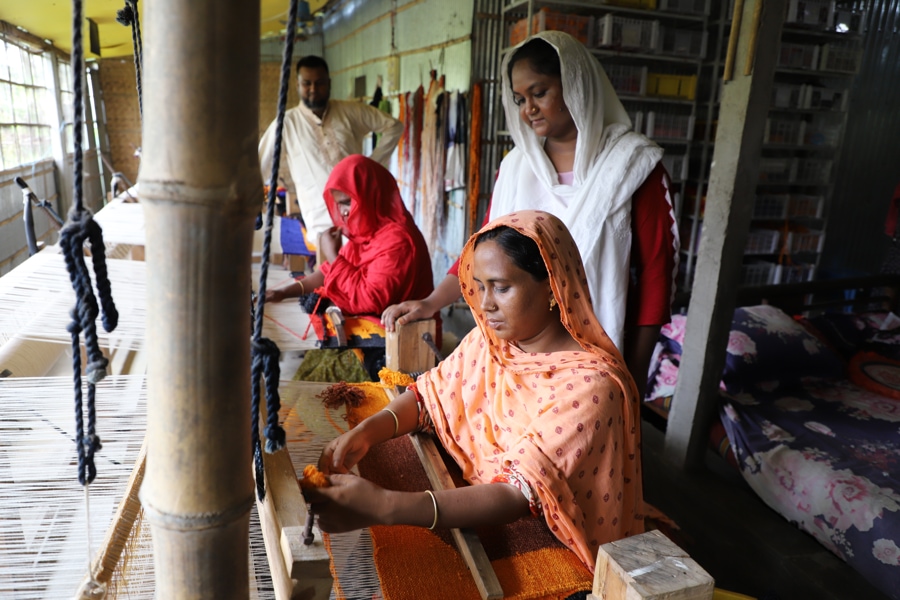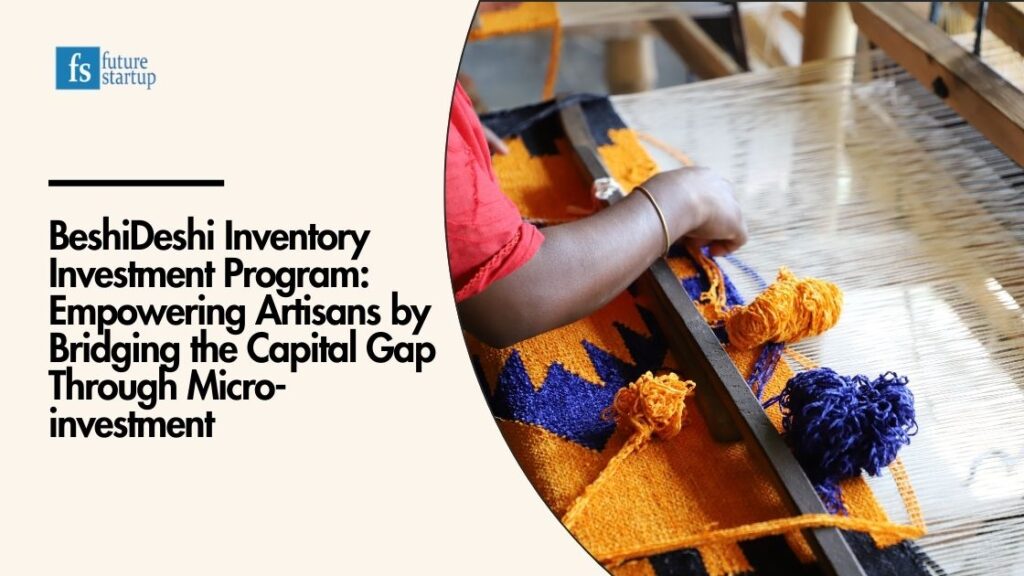BeshiDeshi’s Inventory Investment Program transforms financing for artisans by directly connecting them with investors. It bridges critical capital gaps for artisans who lack access to formal financing while offering investors 15-17% returns on a safe and socially impactful alternative investment option. This isn’t just another microfinance initiative; it’s a reimagined capital flow that has the potential to transform artisan products landscape in Bangladesh. Learn how this simple solution turns inventory into opportunity, creating value for both artisans and investors.
The most elegant solutions often emerge from the most pressing constraints. And nothing reveals constraints quite like a global pandemic.
In late 2020, as COVID-19 ravaged economies worldwide, Bangladesh’s artisan sector faced a devastating double bind: unsold inventory piling up and no capital to buy raw materials for new production.
For most of these artisans, particularly women in rural areas, traditional financing remained inaccessible due to lack of collateral, formal documentation, or credit history.
This is where BeshiDeshi, an artisan products focused e-commerce platform founded by Zeeshan Khurshed Mazumder, saw an opportunity to redesign how capital flows to artisans in Bangladesh.
By this time, BeshiDeshi had been working with artisans in Bangladesh for more than two years. The company was intimately aware of the myriad challenges artisans face. It had evolved from a simple e-commerce platform into a comprehensive ecosystem to address many of these challenges—from mobile photography training that empowered artisans to capture professional product images using their phones, to design consultations that aligned craft with market trends.
When the company came to learn that artisans struggled to fulfill orders due to capital limitations, it decided to jump in to provide financial support to these artisans, which would eventually become its Inventory Investment Program.
“We found out that many artisans face financial challenges when fulfilling large orders,” explains Mazumder. “When large wholesale orders come, producers often need capital to invest in making products. NGOs provide loans, but with high interest rates. Banks take too much time for approval.”
The solution: BeshiDeshi offering loans from its own capital.
“At that time, we couldn’t find any meaningful collaboration to address this challenge”, explains Mazumder. “Unable to collaborate, we began investing from our own funds. We set up a separate financial support system, investing against their work orders. With that capital, they could purchase raw materials, develop products and sell them through our platform. After the sales, when we received payment, we would deduct our portion and pay out the remainder to the artisans.”
The initiative started as an ad-hoc solution but gradually added structure to reduce risks and ensure smooth operation. The team developed a basic tracking system, reference checks for artisans, and a simple registration process for fund applications.
“We started informally,” Mazumder recalls. “It was about helping artisans who had skills and orders but lacked the capital to purchase raw materials.”
These early pilots demonstrated that with the right support, artisans could consistently deliver and repay investments. The team discovered artisans were not “hungry for money,” but sought targeted financial support—requesting only what they needed for raw materials.
“The operation was quite smooth,” Mazumder notes. “Artisans happily accepted the proposal. Our profit/interest rate was considerably lower than what banks or leasing companies would charge. Artisans took only what they genuinely needed for raw materials, and we would provide that amount within a day or two. Out of satisfaction, they would update us on their progress. When we received completed products, we were encouraged that we could expand this model to include more participants. This is how the programme gradually evolved.”
The success of these initial experiments revealed a greater opportunity and gave the company confidence to formalize and expand the program. BeshiDeshi realized it could support more artisans by connecting outside investors with artisans who needed inventory financing thus scaling the program.
Thus, BeshiDeshi’s Inventory Investment Program formally launched in early 2024.
“We launched what we call the Inventory Investment Program in 2024,” Mazumder explains, “a crowdfunding-type initiative where individuals or groups can invest their idle money in our artisans’ inventory. We observed that many artisans maintain products that will eventually sell in the next three or four months, but they face immediate cash constraints. Since we can’t offer them loans through work orders, and bank loans aren’t feasible, we decided to purchase their inventory outright. We would buy it and sell it gradually. This way, cash flows to them immediately.”
The company officially piloted the program in early 2024 with collaboration with Oxfam Bangladesh. At first, it was completely informal: a few well-wishers gave funds to help artisans prepare for Eid orders. Seeing that this not only helped the artisans but also generated predictable returns, it then structured it further with tracking, documentation, and terms. Today,the program has proper agreements, impact reports, and a growing list of funders and artisans.
The core idea of the program is simple: connect investors with artisans to enable micro-investment to bridge the financing gap that most artisans face in Bangladesh. The program enables individual or institutional investors to invest directly in artisan inventory, helping artisans secure raw materials and scale their production. In return, investors either receive a fixed return or profit-sharing, depending on the agreement.
“We realized that if we can connect individuals and institutions willing to invest directly in products, a win-win situation emerges,” says Mazumder. “The investor earns a fixed income or share of the profit from product sales, while the producer receives immediate payment in cash. This creates a compelling opportunity for others to join our journey and become part of a sustainable, impactful value chain.”
By the end of 2024, BeshiDeshi had already purchased about 25,000 products through this model, selling almost all of them while welcoming new investors. The program has created a sustainable cycle: artisans make products and supply them to BeshiDeshi, receive immediate cash, and then create new products.
“Through this, the artisans with stockpiled products don’t have to worry about storage or selling,” Mazumder notes. “They simply make products and supply them to us. We gradually sell these items and provide them with immediate cash. Then they make new products again.”

The Talent-Capital Paradox
Bangladesh’s artisan sector has long been caught in a paradox. The country possesses a rich heritage of craftsmanship and growing international demand for its handmade goods, yet the vast majority of its skilled artisans remain trapped in a financial constraint. The problem is not a lack of skill but rather the absence of working capital.
“Talent is everywhere, but capital is not,” emphasizes Mazumder. Throughout Bangladesh, you’ll find master weavers, expert embroiderers, and skilled craftspeople whose work could command premium prices in global markets. What you won’t find is the working capital needed to purchase raw materials, fulfill larger orders, or scale production.
This mismatch creates a perpetual cycle: without capital, artisans can’t accept larger orders; without larger orders, they can’t generate the capital needed to grow.
Traditional financing is often out of reach for these artisans. Banks require formal documentation and collateral most artisans cannot provide, with approval processes lasting 3-6 months. Microfinance institutions, while more accessible, charge interest rates too steep for thin-margin craft businesses. And philanthropic grants fail to create sustainable business models.
A Third Path
BeshiDeshi’s program creates a third path, an inventory investment program that functions as a structured partnership between investors and artisans. Investors place capital directly into artisan inventory, essentially becoming temporary partners in production. By enabling micro-investments, the program unlocks artisan potential while offering investors a socially impactful and financially rewarding opportunity.
The model is straightforward: funds purchase raw materials, enabling production that fulfills existing orders. Once sales materialize, investors receive either fixed returns or profit-sharing payouts, typically between 15%-17%.
The mechanics of BeshiDeshi’s program explains why it’s been so effective:
- BeshiDeshi identifies artisans with demonstrable skills and market potential but insufficient capital.
- Investors (individual or group) provide funds specifically earmarked for inventory and raw materials.
- A formal agreement is signed—typically for 6-12 months—establishing either a fixed return or profit-sharing arrangement.
- The funds are used exclusively for inventory production.
- BeshiDeshi facilitates sales and ensures transparent tracking.
- Returns flow back to investors according to the agreement.
What makes this model distinctive is its focus on inventory rather than general business operations. By tying investment directly to tangible goods, BeshiDeshi creates natural collateral without requiring artisans to pledge personal assets. The inventory itself becomes the security.
Today, BeshiDeshi’s Inventory Investment Program represents a sophisticated micro-investment model that directly connects individual and institutional investors with artisan businesses. It is neither a traditional loan nor a charitable donation, but a carefully structured financial instrument.
Investors can choose to invest in a specific artisan or contribute to a pooled fund. Investments typically range from 50,000 Bangladeshi Taka, with returns between 15-17%.
The program meticulously screens artisans based on their capacity, order pipeline, and repayment history.

From Informal Beginnings to Structured Program
What started as an ad hoc response to financing challenges artisans face in Bangladesh has evolved into a sophisticated system with formalized processes:
- Initial informal fund rotation during COVID-19
- Development of basic tracking and reference systems
- Formal pilot with Oxfam Bangladesh in early 2024
- Implementation of legal agreements and investment terms
- Creation of inventory tracking and stock insurance mechanisms
- Development of an investment dashboard
This evolution wasn’t merely about adding bureaucratic layers, it was about creating the infrastructure necessary for trust at scale.
Each component addresses a specific friction point that would otherwise limit growth. Legal agreements create clarity around expectations. Tracking systems ensure transparency. Impact documentation connects investors to outcomes. And insurance protects against catastrophic loss.
The program now includes sophisticated safeguards: a reserve fund for potential defaults, transparent reporting, and multiple exit strategies for investors. Unsold inventory is marketed through BeshiDeshi’s online platform or offered at discounted rates, ensuring investors have multiple protective mechanisms.
Transformative Impact
Since launching the program in early 2024, BeshiDeshi has deployed over 10 million Taka in investments, supported more than 20 artisans directly, invested in 200+ units of inventory, purchased 25,000+ products and attracted over 30 individual and institutional investors.
Notably, 85% of investments have targeted women-led or women-majority artisan groups, creating a powerful mechanism for economic empowerment.
The data shows artisan income increasing by 40-60% post-investment cycle, a dramatic improvement that creates cascading benefits for families and communities.
What makes the model particularly compelling is its multi-layered impact.
For Artisans, the program delivers far more than just capital infusion. Formal investment validates artisans as entrepreneurs worthy of financial backing. With adequate raw materials, artisans can accept larger orders and access better markets and bulk purchasing of raw materials improves margins. On top of it, the process of managing investment funds builds business acumen and financial literacy for artisans.
For Investors, the program offers a unique value proposition that combines handsome financial return with the satisfaction of supporting Bangladeshi artisans. The return is competitive (often 15-17%) with lower entry barriers than most investment vehicles. And it offers portfolio diversification into an alternative asset class. Perhaps most importantly, the model allows investors to generate returns through social impact rather than sacrificing returns for impact.
“At present, we offer three incentives to funders who invest with us”, Mr. Mazumder notes. “We give our funders a purpose with our inventory investment. What purpose? They create an impact where our Bangladeshi products are sold, where artists who are disadvantaged get benefits, plus they get a good profit rate.”
And for the broader economy the program preserves traditional crafts by making them economically viable, creates sustainable livelihoods, particularly for women, and builds financial inclusion infrastructure.

The Mechanics of Risk Management
While the BeshiDeshi Inventory investment program effectively bridges the financing gap for artisans and offers a lucrative alternative investment option for investors, no investment model succeeds without effective risk management. Logically, BeshiDeshi has developed several mechanisms to mitigate potential losses:
- Careful artisan screening: Only artisans with existing orders and proven capability are selected.
- Inventory tracking: Physical goods are monitored throughout production.
- Sales facilitation: BeshiDeshi directly connects products to markets.
- Early intervention: At first signs of trouble, the team works with buyers or explores alternative sales channels.
- Reserve fund: An internal pool covers minor defaults.
Even in worst-case scenarios, the physical inventory remains an asset that can be liquidated, providing a floor for potential losses. This risk-management framework makes the model more robust than many traditional microfinance approaches.
Perhaps most surprisingly, BeshiDeshi found that emotional connection plays a significant role in investor decisions. The ability to see direct impact, specific artisans creating specific products, creates an engagement level that purely financial investments rarely achieve.
What makes this model particularly valuable is its potential for replication. The core mechanics could work in virtually any context where skilled producers lack access to formal capital.
The requirements are straightforward. Artisans with marketable skills. A facilitating organization to manage agreements and tracking. Investors seeking both social and financial returns. And legal frameworks permitting such partnerships.
The Middle Path Between Profit and Purpose
BeshiDeshi’s ambition with the program extends well beyond its current operations. “Our goal is to transform this into an open, global platform for micro-investment in ethical artisan businesses,” Mazumder says.
The company is already exploring integrating fintech tools, impact measurement systems, and cross-border sales channels to scale across borders. It also looks to collaborate with other organizations as a way to expand the program. “We want as many collaborators as possible, whether it’s on a project basis or matching with others. We want to work with all kinds of partners—NGO, banks, and so on—to help as many artisans as possible access finance.”
BeshiDeshi has discovered a model that transcends the traditional binary between profit-maximizing business and social welfare. Its program shows that when properly structured, capital can simultaneously generate financial returns and social impact
In doing so, the company has demonstrated that the most effective solutions don’t always require new technologies or massive infrastructure. Sometimes, they simply require reimagining the relationship between existing components.
And for artisans who work with BeshiDeshi, this reimagining has already begun to transform livelihoods.
If you’re interested in learning more about BeshiDeshi’s Inventory Investment Program, the BeshiDeshi team welcomes inquiries from potential investors, artisan groups, or organizations interested in collaboration.

